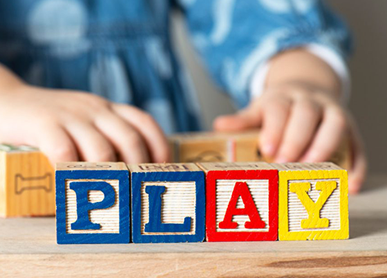
Together Tree provides Theraplay to children and families. Theraplay is a child and family therapy for building and enhancing attachment, self-esteem, trust in others and joyful engagement. It is based on the natural patterns of playful, healthy interaction between parent and child and is personal, physical, and fun.
Theraplay interactions focus on four essential qualities found in parent-child relationships: Structure, Engagement, Nurture, and Challenge. Theraplay sessions create an active, emotional connection between the child and parent or caregiver, resulting in a changed view of the self as worthy and lovable and of relationships as positive and rewarding.
In treatment, the Theraplay practitioner guides the parent and child through playful, fun games, developmentally challenging activities, and tender, nurturing activities. The very act of engaging each other in this way helps the parent regulate the child’s behaviour and communicate love, joy, and safety to the child. It helps the child feel secure, cared for, connected and worthy.
Theraplay as an intervention for children who can present with:
• Shy, withdrawn, or clingy behaviour
• Acting-out, angry, or disruptive behaviour
• Defiant, oppositional or controlling behaviour
• Behavioural problems at school or with peers
• Attention Deficit Disorder or Attention Deficit Hyperactivity Disorder
• A history of trauma, abuse, or neglect
• Attachment disorder due to adoption or multiple changes in living arrangements
• A history of social deprivation and poverty
Theraplay is most effective for children 0-12 years but can be adapted for teenagers and blended with other interventions.
Theraplay® is a registered service mark of The Theraplay Institute, Evanston, IL, USA.

Helen worked as our son’s therapist when he came to us after his adoption. She very skillfully led my son and myself through Theraplay sessions working through early life trauma and enabling attachment. The difference these sessions have made in our son’s life is remarkable. He has become much more settled and strongly attached to us as his parents. As a whole family we have received superb care and practical support. As parents we have been equipped with a new set of skills in supporting or son. Helen’s therapy sessions have made such a positive difference.


The first appointment is an information-gathering meeting, preferably with both parents. Next, you and your child complete a set of simple tasks together, such as make two toy animals play with each other or build a structure from a set of building blocks.
This is called the Marschak Interaction Method (MIM) assessment. The MIM is visually recorded, and then the Theraplay practitioner will look at the video in preparation for your next appointment at which you and your practitioner will discuss the interaction between you and your child and the recommendations for treatment. This session generally will also include a demonstration of Theraplay activities with you in order to familiarise yourself with what to expect. Theraplay activities are playful and fun and they focus on your child’s needs for structure, engagement, nurture and challenge.
Then, Theraplay Treatment begins with your child. Sessions are visually recorded and after every four Theraplay sessions, we will meet without your child to discuss progress and goals, support you in your parenting and in using some Theraplay activities at home. Sometimes parents need more support/preparation time before Theraplay sessions begin and this can be built in when treatment planning.
The total number of sessions is usually 19-28 with one or two follow up sessions. (Treatment might last for approximately 6 months).
Treatment Plan for Families Created Through Foster Care, Adoption and Special Guardianship.
Children who have experienced separation, loss, trauma, and/or multiple caregivers generally need more help than the standard Theraplay treatment described above.
The assessment process may lead to a recommendation of more sessions, longer sessions or more frequent sessions. (Treatment might last between 9-18 months).
Further recommendations may be appropriate in order for your child to process the past or to have more body based treatments such as sensory integration therapy, for example.
A significant aspect of your treatment plan is supporting you in your role as a parent. At Together Tree it’s not just about the child in session, we’ll explore, think about and advise on why your child might behave the way he/she does based upon the latest research about the developing brain and attachment. Many children who have experienced trauma need a different style of parenting – therapeutic parenting, and you will be given support around this. This may include trying different parenting approaches.
In all cases, the practitioner will be sensitive to your family’s needs and sign-post where possible for services that cannot be provided at Together Tree.